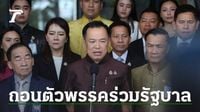In a dramatic political development on June 18, 2025, Thailand's Bhumjaithai Party announced its immediate withdrawal from the coalition government, a move that sent ripples through the nation's political landscape. The decision came in the wake of a controversial phone conversation between Prime Minister Paetongtarn Shinawatra and Samdech Hun Sen, President of the Cambodian Senate, which the party claims has seriously undermined Thailand's sovereignty, territorial integrity, national interest, and the honor of its armed forces.
The Bhumjaithai Party's executive committee convened to deliberate on the fallout from the leaked audio clip, which has been widely disseminated and scrutinized by the public. After careful consideration, the committee unanimously resolved that the party must withdraw from the coalition government to uphold national dignity and sovereignty. All ministers affiliated with Bhumjaithai promptly submitted their resignations to the Prime Minister, with these resignations taking effect on June 19, 2025.
In an official statement issued at 8:30 PM on June 18, the party expressed deep concern over the implications of the phone call, emphasizing that it affected not only Thailand's territorial and sovereign rights but also the interests of the Thai military. The party urged Prime Minister Paetongtarn Shinawatra to take full responsibility for the incident, which they say has caused the nation to lose honor and dignity. The statement underscored the gravity of the situation, noting that the repercussions extend beyond political maneuvering to the very essence of national pride and security.
"The Bhumjaithai Party calls on Prime Minister Paetongtarn Shinawatra to demonstrate accountability for actions that have led to the loss of Thailand's honor and dignity, affecting the nation, its people, and the military," the statement read.
Moreover, the party pledged unwavering support to the Thai people and the armed forces, vowing to collaborate with all relevant officials to safeguard Thailand's sovereignty, territory, and national interests by all means necessary. This commitment reflects a determination to protect the country's integrity amidst what many perceive as a diplomatic misstep with significant domestic consequences.
The controversy sparked intense reactions across the political spectrum and social media platforms. Supporters of the Ruam Thai Sang Chart Party flooded their Facebook page with comments demanding a clear political stance following the release of the audio clip. The incident has reignited concerns about Thailand's diplomatic posture and the government's handling of sensitive cross-border issues.
Adding to the political tension, the Palang Pracharath Party issued a statement expressing apprehension over the current administration's approach to internal security and foreign policy, particularly highlighting perceived weaknesses in Prime Minister Paetongtarn's negotiation skills and experience in resolving the Thai-Cambodian dispute. This critique signals growing unease within the ruling coalition and among allied parties.
Notable figures within Bhumjaithai also voiced their sentiments. Anutin Charnvirakul, Deputy Prime Minister and Minister of Interior and leader of the Bhumjaithai Party, posted a photograph alongside Lieutenant General Boonsin Padklang, commander of the 2nd Army Area, signaling solidarity with the military. Meanwhile, Newin Chidchob, chairman of Buriram United Football Club and a prominent party figure, shared a graphic of the Thai national flag emblazoned with the phrase, "The nation will not be ridden over by anyone," underscoring the party's nationalist stance and resolve.
Approximately thirty minutes before the party's official announcement, Newin Chidchob posted on his Facebook page "Lung Newin" a succinct message: "#ThaiIdentityNotSlavery," which many interpreted as a pointed critique of the Prime Minister's handling of the diplomatic incident.
The Bhumjaithai Party's withdrawal marks a significant realignment in Thai politics, raising questions about the stability of the current government and its capacity to navigate complex regional relationships. The timing of the resignations, effective June 19, ensures an immediate impact, signaling the party's serious stance on sovereignty issues.
Observers note that this incident underscores the delicate balance Thailand must maintain in its foreign relations, particularly with neighboring Cambodia, where historical territorial disputes and national pride are deeply intertwined. The leaked phone conversation has evidently struck a nerve, prompting political actors to take decisive steps to reaffirm Thailand's sovereignty and national dignity.
As the situation unfolds, the focus will be on how Prime Minister Paetongtarn Shinawatra responds to calls for accountability and how the government addresses the internal and external ramifications of this controversy. The Bhumjaithai Party's commitment to supporting the military and cooperating with the Thai people to defend national interests suggests that the party intends to continue playing a pivotal role in shaping Thailand's future, albeit from outside the government.
This episode serves as a stark reminder of the potent intersection between diplomacy, national identity, and domestic politics in Southeast Asia, where historical sensitivities and contemporary power dynamics often collide with profound consequences.






